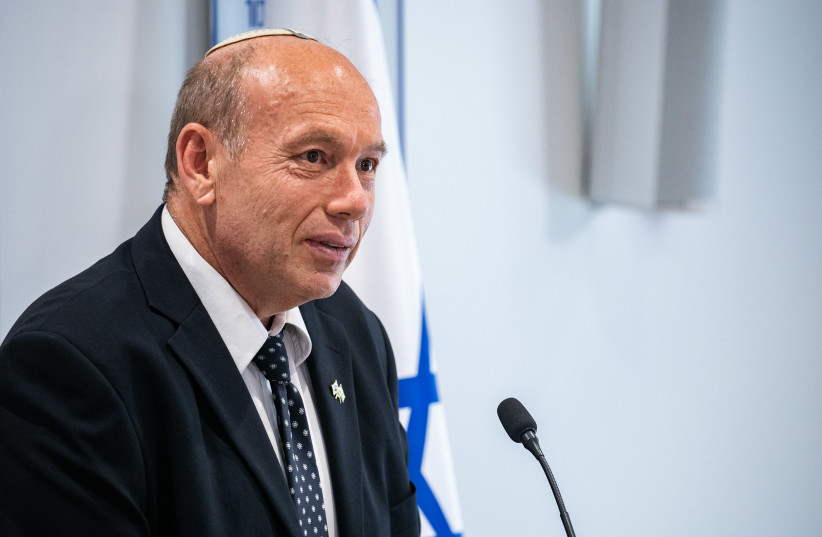One out of every three online sexual-related criminal offenses is perpetrated against a minor, State Comptroller Matanyahu Englman said Monday in a special report.
In addition, one out of every four victims being illegally filmed is a minor, and one out of every 10 minors experiences bullying on social media, the report said.
“This and other data is a red light for decision-makers in general and for the education establishment and law enforcement more specifically,” Englman said.
There must be elevated awareness, especially in the current coronavirus era, when there has been a spike both in minors’ use of the digital realm and cybercrime, he warned.
“The responsibility to protect minors falls to the police to enforce and the Education Ministry to treat,” the Israel National Council for the Child said in response to the report’s findings.

In 2016, the government decided to establish a task force to handle issues related to the abuse of minors online.
However, the comptroller said this process had moved slowly, and the new body only became operational in 2018.
It is referred to in the report as part of the 105 helpline and task force.
The 105 task force includes police intelligence, investigation and emergency-response units.
The report focused its review on the Education Ministry and the police, but it also evaluated as secondary actors the Justice, Public Security, and Communications ministries, the Labor, Social Affairs and Social Services Ministry, the National Insurance Institute and the Prisons Service.
According to the comptroller, as of last October, the intergovernmental steering committee on the issue still had not articulated a national coherent strategy to unite all of the disparate agencies’ efforts.
Englman, who is currently first vice president of EUROSAI, a global network of countries’ ombudsmen, said the international guidance on combating victimization of minors was that a national strategy is critical to success.
From a survey of the Health Behavior in School-aged Children (HBSC) agency in 2019, 70% of those minors surveyed who were harmed through social media did not report the incident to anyone.
Since 1982, HBSC, affiliated with the World Health Organization, has been a pioneer cross-national study gaining insight into young people’s well-being, health behaviors and social context.
A 2019 survey by the Public Security Ministry found that 41% of minors surveyed had never heard of the 105 helpline and task force.
According to a survey by the Comptroller’s Office last July, 51% of parents surveyed had never heard of the 105 helpline and task force.
Another side of the report related to the Arab-Israeli sector, which constituted 10% of the complaints, according to the report. Despite representing 10% of callers, as of last August, no one on the helpline spoke Arabic, it said.
To address the issue, the helpline has drafted temporary Arabic-speaking volunteers from the broader police force or from the Education Ministry and, as of last November, one helpline worker was undergoing Arabic-language training.
“[The 105 helpline] is lacking the basic technological tools necessary to help minors, which is unacceptable,” the Israel National Council for the Child said.
The weakness in Arabic intake was problematic, the report said. Calls from Arabic-speaking minors often included complaints that someone sent them sexual pictures or videos, or media that portrayed them in an immodest fashion, which could harm their social standing in the broadly conservative Arab sector, it said.
Forty-five percent of minors said they would prefer to file a complaint with the helpline using social media, though the helpline can only receive telephone complaints, the report said.
Some 56% of the complaints were categorized as involving criminal issues, and most of them were referred to the police, but there was not an exact count, Englman said.
In fact, no one followed up between the helpline and the police investigations division to trace the progress and developments in the cases, he added.
Of the limited tracking of cases the 105 task force referred for police criminal investigations, 441 out of 1,704 were quickly closed as economic disputes lacking a basis for a full criminal probe. This occurred even though an official who was part of the 105 task force had performed an initial evaluation of the complaint and found that there were suspicions of criminality, the report said.
In addition, it appeared that police investigations officials closed referrals from the 105 task force as often – just over 70% of the time – as complaints that came in off the street and had not undergone any vetting, it said.
In August 2020, the 105 helpline received an additional budget of NIS 2.7 million to update its technological devices in the office to a better standard. However, it took too long for this budget to be allocated, and the 105 helpline is still technologically deficient, the report said.
Jerusalem Post Staff contributed to this report.
